Pumpkin sprouts for seedlings and food at home: how to germinate pumpkin seeds and preserve them for a long time
Pumpkin seeds are called a “miniature pharmacy” for a reason – they contain almost all the vitamins and microelements. And sprouted ones have even more benefits for the human body. This is real “living food”. The composition of sprouts differs from ordinary dried seeds.
In this article we will tell you in detail how to properly germinate pumpkin seeds and use them for health benefits.
Composition and beneficial properties
Pumpkin seeds contain 27-28% protein and up to 50% vegetable oils. They are rich in fiber and omega-3 and omega-6 polyunsaturated fatty acids. They also contain other useful acids: folic, linolenic and glutamic.
Pumpkin seeds contain a huge amount of vitamins: A, E, group B, T, K, C, P. The content of macro- and microelements is also impressive:
- potassium;
- magnesium;
- calcium;
- phosphorus.
- iron;
- iodine;
- zinc;
- copper;
- selenium;
- chlorine;
- manganese;
- cobalt;
- silicon;
- fluorine.
And when sprouted, the benefits of pumpkin seeds only increase. Sprouting stimulates fermentation and changes the composition of the seeds. Complex proteins and carbohydrates are broken down into simpler and more easily digestible ones. The amount of vitamins and beneficial fiber content increases tenfold.
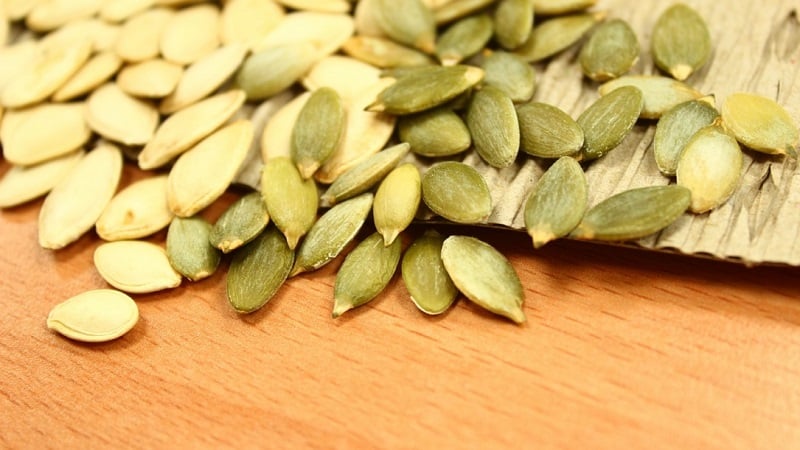
How to prepare seed material
Material for germination is collected from vegetables that have ripened before frost. The cut fruit is kept warm for about a month. Then the pumpkin is carefully cut so as not to damage the seeds - a little on the side, and not in the center. The seeds are removed, cleared of pulp and washed with cool water. Then they are dried in a warm, dry room.
Attention! For germination, select large seeds without damage.
Germination methods
Pumpkin seeds germinate slowly and unevenly. On average, 3-6 days pass before sprouts appear, depending on the size of the seeds and the chosen germination method. Read below on how to germinate pumpkin seeds.
In a wet napkin/cloth
The traditional way to germinate seeds is on a plate. It is covered with a napkin, paper, gauze or other fabric that absorbs water well (cotton, lignin). Sprinkle germination material on top in one layer and water with warm boiled water. Until the seedlings appear, make sure that the napkin or cloth is always damp.
There is another way: the seeds are poured into a small bag made of linen or linen. Twice a day, immerse it in water for one minute, and then hang it up so that the water drains. In the same bag you can then store the sprouted product in the refrigerator.
Soaking in a jar
Pumpkin seeds are germinated in a jar as follows: poured in so that they cover the bottom. The opening of the vessel is covered with a sieve lid or gauze secured with an elastic band. Then several liters of running water are passed through it to wash the seeds. After this, pour clean water into the jar to fill half its volume and leave to soak for 6-8 hours in a normal vertical position. Large seeds can be left for 10 hours.
After this time, the jar is placed so that excess water can drain into the container. The vessel is placed in a warm, dark place.The seeds are rinsed with water two to three times a day. Do this until sprouts appear (about 2-3 days).
Advice. For this method, it is more convenient to use a sieve lid rather than gauze. On it, the inverted can stands at an angle due to the protrusion, and air can freely penetrate into the can. Greenhouse conditions are created, and seedlings appear faster.
Application of germinated seeds
Sprouted seeds are used for further growing seedlings and eating. Let's tell you more about each option.
For seedlings
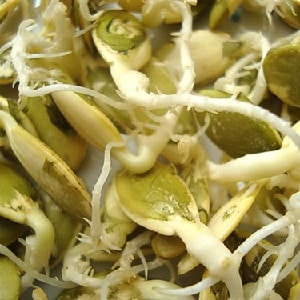 First of all, pumpkin seeds are heated for a month near a heating device or stove. This increases the chances of getting more female flowers, which means a good harvest.
First of all, pumpkin seeds are heated for a month near a heating device or stove. This increases the chances of getting more female flowers, which means a good harvest.
Purchased seeds can be germinated immediately - they are usually already processed. But if you have your own seeds, collected from a previous harvest, you must perform the following steps:
- Selection of material. Empty, thin and dried out seeds are not suitable for this purpose. They must be checked for germination by soaking in a salt solution. Those that do not drown will not sprout.
- Hardening. The seed, wrapped in a damp cloth, is kept in the refrigerator for three days. This helps the seedlings adapt more quickly to weather changes.
- Disinfection. Before planting, soak for 10 hours in a weak solution of potassium permanganate or water with aloe juice.
During germination, the fabric is moistened as it dries. It is important that it is not wet, but moderately damp.
It is convenient to grow seedlings in special peat pots. But if they are not available, homemade containers made from toilet paper will also work (when the seedlings are transferred to the beds, it will dissolve in the soil).
For consumption
It is better to eat the sprouts immediately, but you can also leave them in the refrigerator for 1-2 days. The recommended daily intake is 100 grams 20 minutes before breakfast. Before eating, they should be washed with cold boiled water.
The white sprouts have a bitter taste, so you can cut them off and only eat the seeds themselves. Or start eating seeds already on the 2nd day, without waiting for the bitter roots to appear. All important processes have already occurred in the swollen seeds.
There is another option for using sprouted pumpkin seeds. They are sprouted in soil for seedlings until cotyledon leaves appear on them. And these leaves are eaten. In this case, the soil is a mixture of sawdust and river sand in a 1:1 ratio, pre-treated with boiling water.
Tips and tricks
Gymnosperm pumpkin seeds are more suitable for germination. They do not have a dense shell like other varieties.
To soak the material, it is recommended to use melt water at room temperature - it brings the seeds out of “hibernation” faster. If you don't have snow on hand and you don't want to deal with freezing and thawing liquids, you can use another trick. Boiling water quickly cooled to +20 degrees has a good effect.
Important! When soaking pumpkin seeds, remember that overwatering is more harmful to them than underwatering. If the layer of liquid is more than 1 cm above the seeds, germination will be poor (25-30%).
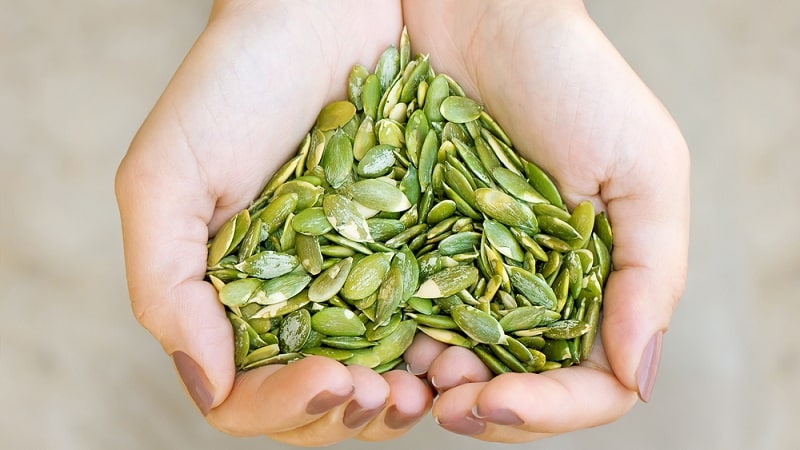
Why are they useful?
Regular consumption of sprouted pumpkin seeds improves immunity. Sprouts have anti-inflammatory and androgenic properties.
Regular consumption of them:
- replenishes the deficiency of essential vitamins, minerals and beneficial acids;
- normalizes water-salt and cholesterol metabolism, the process of hematopoiesis and natural insulin synthesis; this makes them especially useful for type 2 diabetes;
- cleanses the body of waste and toxins, heavy metals and salts;
- restores the functioning of the liver and bile ducts;
- normalizes the functioning of the genitourinary system;
- improves the functioning of the digestive system;
- normalizes the functions of the reproductive system in men and women;
- increases physical and mental performance, relieves stress and relieves fatigue;
- restores the water-lipid balance of the skin, improves the condition of the skin, hair and nails.
Pumpkin seed sprouts are also good for children. Their composition helps to increase mental abilities and improve memory, which is important for schoolchildren. Regular consumption of pumpkin sprouts has a beneficial effect on the growth and puberty of adolescents.
Pumpkin seeds are an indispensable product in the diet of pregnant and breastfeeding women. It contains everything necessary for the full development of the fetus and the mother’s body. Vitamin E and folic acid contained in the plant product stimulate lactation and improve the taste of milk.
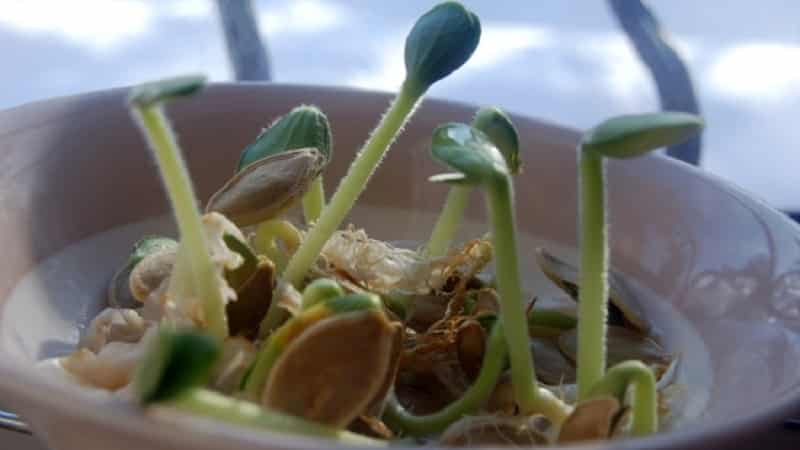
Recipes
Sprouted pumpkin seeds do not have to be eaten only in their pure form. They are added to different recipes: cereals, yoghurts, salads, soups and baking dough. They are combined with vegetables, fruits, nuts and honey. It all depends on your imagination and taste preferences.
Bakery
Sprouted pumpkin seeds add a special taste to baked goods. You can safely add up to 1/3 of the total mass to the dough. But if you take a large number of seeds, do not germinate them until sprouts appear - they will reach the required condition in the test.It is enough to pre-soak them for 4 hours, and then add them to the kneading mass.
Pumpkin flour is also made from dried sprouted seeds. For 800 g of wheat flour take 4 tbsp. l. ground seeds. This enriches baked goods with easily digestible proteins and increases its organoleptic properties. In addition, this product remains soft for a long time.
Reference. Pumpkin flour is used as a breading for meat and fish cutlets and schnitzels.
Cold pumpkin soup
For lovers of first courses, there is an excellent recipe for making cold soup with pumpkin, sprouted pumpkin seeds and celery.
Ingredients:
- pumpkin – 180 g;
- sprouted pumpkin seeds – 60 g;
- apple – 1 pc.;
- celery – 120 g;
- kefir – 300 ml;
- salt - to taste.
Preparation:
- Cut the pumpkin pulp into small cubes and steam. Refrigerate.
- Chop the celery and grate the apple on a coarse grater.
- Combine all ingredients and add sprouted seeds.
- Add salt to taste and pour in kefir.
Salad with sprouted seeds “Mega useful”
Ingredients:
- carrots – 1 pc.;
- sprouted pumpkin seeds - 2 tbsp. l.;
- red pepper – 1 pc.;
- radicchio and corn salad – 50 g each;
- juice of half a lemon;
- olive oil – 2 tbsp. l.
Preparation:
- Cut the peppers and carrots into thin strips or grate them on a coarse grater.
- Mix carrots, peppers, sprouted seeds and herbs.
- Season the resulting salad with olive oil and lemon juice. If desired, you can add a little salt.
- Place the salad in the refrigerator for 15 minutes to steep.
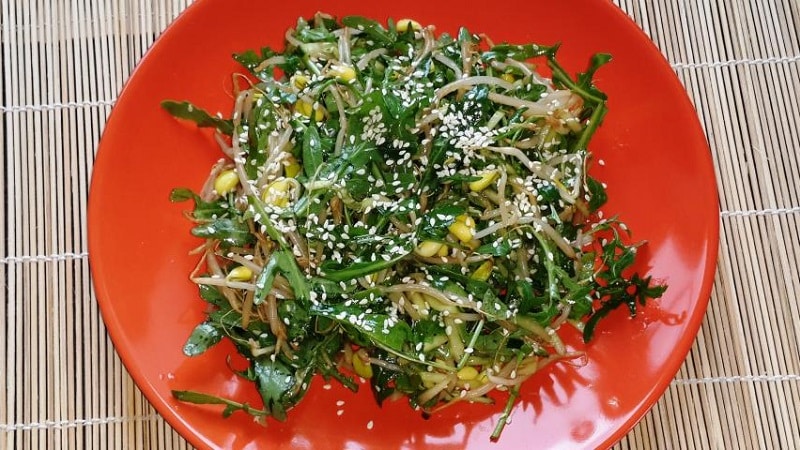
Contraindications
Like any product, pumpkin seeds have contraindications for use. In addition to people with individual intolerances and allergies, they should be used with caution when:
- increased stomach acidity;
- exacerbation of gastrointestinal diseases;
- obesity.
Attention! For stomach and duodenal ulcers, gastritis During exacerbation and colitis, consuming pumpkin seeds is strictly prohibited.
Storage rules and periods
The seeds should be dried first - this will prevent them from spoiling longer. In a closed glass container they are stored at a temperature of +3 to +6 degrees for 3-4 days.
Attention! Sprouted seeds are even frozen. In the freezer, their shelf life is about 3 weeks.
Dried
Dried seeds are stored in glass jars or bags made of natural fabric. Choose a cool, dark place for storage. Peeled seeds can be stored in the vegetable section of the refrigerator for about a month, and dry seeds can be stored for no more than a year.
Storing products with sprouts
Smoothies and vitamin cocktails with sprouted seeds can be stored in the refrigerator for no more than 12 hours. But it is better to consume them within 6 hours after preparation. Baked goods can be stored for 3 to 5 days at room temperature.
Raw candies made from sprouted seeds last the longest. Honey is added to them as a natural preservative. Such sweets will not disappear in the refrigerator for 5 days.
Conclusion
Pumpkin seeds are a real storehouse of vitamins and microelements. These little helpers, fighting various diseases, help prolong and improve the quality of life. One tablespoon of sprouted pumpkin seeds per day is enough to maintain health. However, they should not be considered a panacea for all diseases.
Before you start regularly eating sprouted seeds, make sure that you have no contraindications.Otherwise, such a product will not only not be beneficial, but will also cause harm to the body.